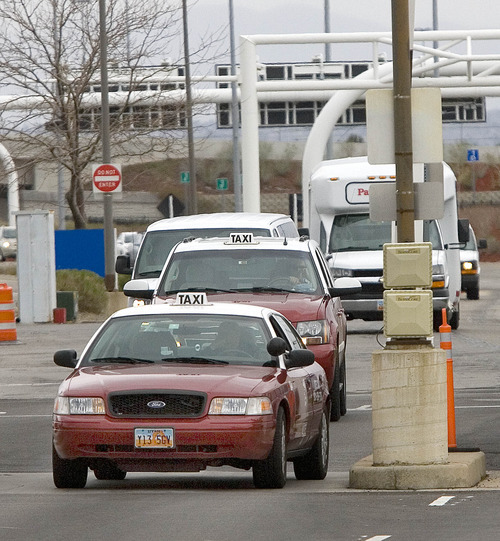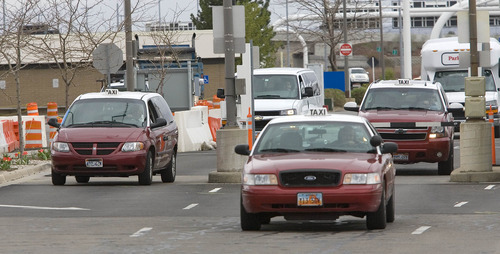This is an archived article that was published on sltrib.com in 2012, and information in the article may be outdated. It is provided only for personal research purposes and may not be reprinted.
Two Utah-based cab companies contend legislation signed by Gov. Gary Herbert should stop Salt Lake City from awarding contracts to two out-of-state firms for new taxi services.
In a lawsuit before a 3rd District Court judge, the companies say HB104, the so-called anti-idling bill that is now law, contains a provision that prohibits Salt Lake City International Airport from imposing age and mileage requirements on ground transportation vehicles as long as they can pass safety and emission standards.
On Thursday, Senior City Attorney Wesley Robinson told Judge Kate Toomey that the bill, signed Monday, has no bearing on the city's authority to award contracts for new taxi services. He said he will file a written response to the court at a later date.
Instead, Robinson argued Toomey should dismiss the lawsuit brought by Yellow and Ute Cab companies. He said state statutes contain no provisions that would give the court jurisdiction over decisions made by the city's appeals boards, which have tossed out claims that the bidding process was unfair.
Toomey did not indicate when she would rule.
In October, Toomey issued a temporary restraining order blocking the airport from implementing new taxi services in Salt Lake Valley until legal challenges on the bidding process could be heard. The order effectively put on hold new taxi services, which had been scheduled to begin in November.
In court filings, Yellow Cab attorney Donald Winder said the recently enacted law, which is retroactive, invalidates contracts to the out-of-state firms for taxi services because the award was largely based on the companies' promise to provide newer vehicles.
"In short, the state has since gotten into this fray by enacting HB104, and confirming municipalities do not have unfettered authority to do what the city has attempted to do with respect to taxicab service in Salt Lake City," he wrote.
Sen. Scott Jenkins, R-Plain City, who helped sponsor the bill, said he was unaware of its possible impact on Salt Lake City's plans for new taxi services. But he added that the legislation is fair.
"If the vehicles aren't spewing rotten emissions into the atmosphere, why should anyone care about age and mileage?" he said. "As long as the vehicles are well maintained and they pass safety inspections, how old they are doesn't hurt anything."
Earlier this month, the Legislature and Salt Lake City reached a compromise over HB104, which was originally designed to thwart the city's ban on excessive car idling. After several amendments, the bill allows for enforcement on private property only if it is open to the general public — not in places such as private driveways.
At the time, there was little public discussion on provisions in the bill involving ground transportation vehicles.
Sen. Ben McAdams, D-Salt Lake City, who was involved in the legislative compromise, said the final bill was intended to allow city ordinances involving idling and taxi services to survive "largely intact."
"Going forward, the city will measure suitable ground transportation vehicles based on emissions and safety standards. The legislation was not intended to have a retroactive effect on the [taxi contracts] already awarded by the city," said McAdams, who is senior advisor to Mayor Ralph Becker but not involved in the lawsuit.
Last year, airport administrators awarded new contracts to the Cleveland-based Ace Taxi Service and Total Transit, headquartered in Glendale, Ariz. Under the new contracts those companies' taxis would be the only ones allowed to queue up to transport passengers from the airport or pick up riders anywhere in the city on demand, meaning no prior arrangements need be made.
In 2006, the City Council voted to terminate its longtime permits, called certificates of convenience, with the Yellow, Ute and City cab companies. Despite uncertainties over the certificates in the ensuing years, the cab companies have continued to provide services.





